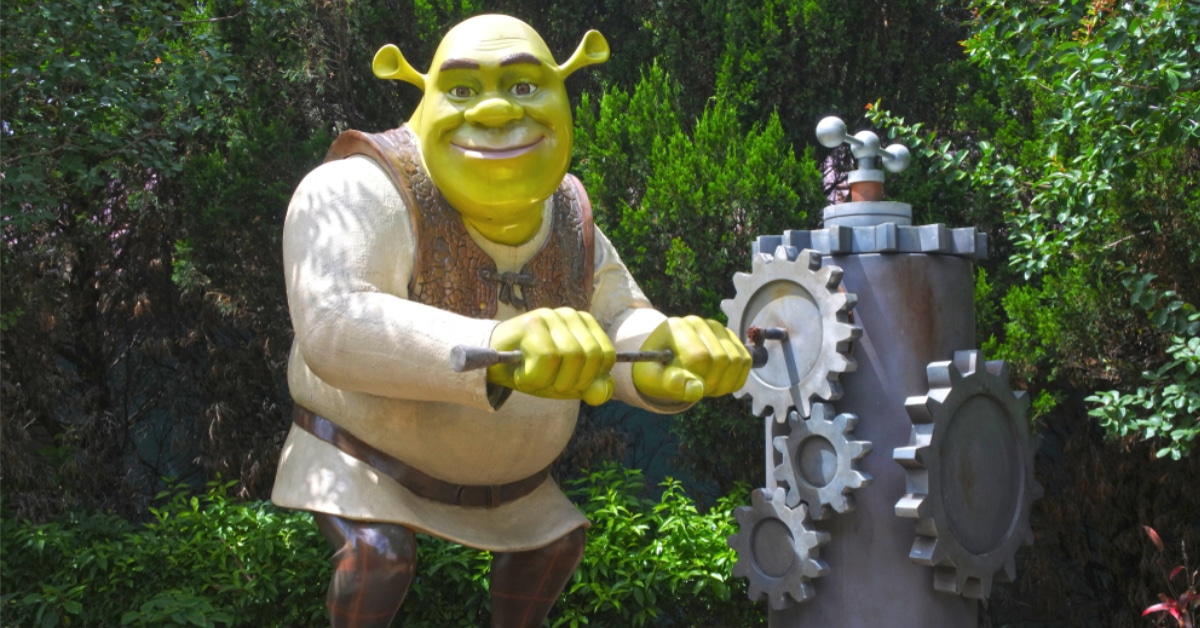Shrek is an animated film series that was a significant part of our childhood and teen years. We grew up watching the film series repeatedly until we had memorized the lines of our favorite characters’ post-credit scenes by heart. Without a shred of doubt, Shrek is a film series worth watching.
But there’s something even more remarkable about it: the Spanish Shrek film series is perfect for teaching your kids rhymes, idioms, and expressions. Moreover, the script is a masterpiece of clever jokes and vast linguistic wealth. In this article, we’ll focus on the first volume of this series, Shrek 1. Come and learn Spanish with Shrek!
The Not-So-Neutral Spanish Dubbing
There’s something about Spanish dubbed movies you might not know. The translation is supposed to be in Standard Spanish. However, it’s not as neutral as you would expect it to be. It mostly sounds like Mexican Spanish. So, what is Standard Spanish? And why does it sound mostly Mexican in Spanish dubbing?
Since there are many Spanish variations, it is difficult for companies to localize and adapt the Spanish they use in media to every single region. That’s why Neutral or Standard Spanish emerged, and it comprises a broad set of selected common and intelligible terms that make sense to most Spanish speakers.
However, studios have to optimize their way of making money, as all businesses do. For that reason, Spanish dubbing studios always try to reach their closest and most profitable audience, the Hispanic and Latino community in the US. Hispanic refers to people who speak Spanish or have a background in a Spanish-speaking country. In contrast, Latino refers to someone’s geographical roots in Latin America, including Central America, South America, and the Caribbean.
Within the Hispanic and Latino community in the US, Mexicans represent a whopping 61.9%. Hence, Spanish dubbing tends to include many Mexican idioms and expressions that can be useful to you if you want to teach your kid Mexican Spanish. That said, we’ll go through this Dreamworks movie to explain what you can learn from the Shrek film dubbed in Spanish.
How can you improve your Spanish with Shrek 1?
The Shrek movie, just like the rest of the film series, is a clear example of the freedom a dubbing translator can take to adapt dialogues from one language to another and make it a masterpiece.
On some occasions, dubbing actors modify their pronunciation or tone to express a feeling or intention, which can help you broaden your overall vocabulary and listening comprehension. Plus, you can learn handy cultural facts and compare the original version and the Spanish dubbed version. As a result, you can grasp changes in the dialogues, references, and parodied folktales, thus making your experience watching the film much richer.
Learn Spanish with Shrek for all ages & levels
Shrek in Spanish goes the extra mile for conveying emotions, thoughts, and feelings in the way a Latin American would, in a suitable script for an audience of all ages.
While it is recommended that you have at least a lower intermediate level to watch the movie entirely in Spanish, context and your previous knowledge from the original version can help you a long way if you’re a Spanish beginner.
The Spanish you’ll learn from Shrek includes the following Mexican expressions:
Se fueron de volada (They left in a flash)
De volada is a Mexican slang phrase that means “quick,” “fast,” “in a flash,” or “now.” It’s synonymous with rápido.
¡Qué chido! (How cool!)
Mexicans use this expression to describe something good, nice, cool, or beautiful. However, Mexicans also use it to agree, thank, say that a person is good-looking, and show displeasure.
Yo solito (Me, by myself)
It is common in Latin America to say things like yo solito(a). The diminutive of solo(a) creates empathy in the listener, and Spanish-speaking children often use it when they consider themselves little and want their effort to be cherished.
Tengo una ideota. (I have a big idea)
In Mexican Spanish, people use the suffix -ote, and its feminine counterpart -ota to talk about big things or something important. In this case, a big idea can have an enormous impact and be significant.
Necesitas unas pastillitas de menta porque el hocico te apesta.
(You need a few little mints because your snout stinks)
We all know that Shrek isn’t human; he’s an ogre. That’s why Burro uses hocico with him; it’s a word that refers to animals’ mouths, but it’s also a rude way to shut people up. Anyways, something else catches our attention. This phrase rhymes, just like the following we’ll explain to you. Making things rhyme in a translated script is a whole subdomain of Translation called Literary Translation, and it’s art!
Porque ‘toy solito no hay nadie aquí a mi lado, no habrá problemas hoy de mi ya se han burlado.
(Because I’m all alone, there’s no one next to me/by my side. They’ve already made fun of me today, so I won’t make any problems/you won’t hear from me)
Shrek’s characters even sing rancheras, a genre of Mexican traditional music. When Shrek refuses to let Burro (Donkey) in his house, Donkey sings a short ranchera verse to persuade him to let him in.
Porfis (Please)
Popular in Mexico and Venezuela, it’s a contraction of porfa, the shortening of por favor, and the suffix -is.
¿De veras? (Really?)
It’s a Spanish interjection that conveys disbelief.
No sabes que gacho es que te consideren un monstruo.
(You don’t know how awful it is to be considered a monster)
The Shrek film series in Spanish also teaches you about tolerance, consideration, and acceptance. In this phrase, Shrek 1 reminds us that words can hurt. Here, screenwriters use the Mexican word slang gacho, which can have different meanings depending on the context, such as:
- Lean towards down, drooping, hanging, turned down
- Awful, ugly, crappy, unpleasant
- Mean, messed up
- Really, badly
However, later in the movie, we learn that we may not be right when we assume that others don’t like us. Sometimes they can be as insecure as we are.
Güeno/Weno, a lo mejor sí. (Well, maybe, yes)
Sometimes, Spanish speakers from rural regions pronounce the BUE syllable as güe or we (WEH). This pronunciation derives from the Castilian spoken in times of the Colony when it was allowed to stress words starting with the combination HUE and BUE with a Spanish G sound.
Therefore, words like huerta (orchard) and abuela (grandma) sounded like güerta and agüela, and up to this day, you may find this pronunciation in natives. It is essential to highlight that when Latinos whine, they tend to use this kind of pronunciation, as it sounds more vulnerable to the listener than the original one.
¡Ay caray, qué padre! (Oh, wow, how cool!)
Probably the most famous exclamation in the Hispanic community. You might have heard it as well in cartoons like The Simpsons. Depending on the intonation you use with it, you may express astonishment or sarcasm.
Prefiero dormir ajuera, ¿no?
(I prefer to sleep outside, don’t I?)
Sería más fácil si no juera daltónico.
(It would be easier if I wasn’t daltonic)
Se me jue el aire, jue horrible, jue horrible.
(I lost my breath, it was horrible)
When it comes to the fricative consonant F, Shrek’s characters pronounce it just like Mexicans do in an informal context. The rule to know when to pronounce F as a Spanish J and when not is the following. If F is at the beginning of words, it sounds like a standard F (for example, fiesta, fácil). When F is before UI and UE, people can change the F sound for a J sound. Therefore, words like fuimos, fuerza, and afuera will sound like juimos, fuerza, and ajuera.
Esos cuates me querían como burro de carga.
(Those homies wanted me as a packhorse)
Cuate is a Mexican slang word from the Nahuatl word coatl (twin or snake). Since there was already a word for “twin” in Spanish, the word cuate was then used to refer to a close friend in the same way we address our pals in English as “homies” or “brothers”. The translation of this phrase also holds a punchline; Donkey complains people he trusted wanted to use him and exploit him, choosing the word packhorse as a reference.
Soy un burro, pero si estoy solito, me aburro.
(I am a donkey, but if I’m alone, I get bored)
No one likes to feel alone in this world, and Donkey expresses his social wants with this funny rhyme and wordplay. In Spanish, some words can be contrasted when adding an A in front of them. In this way, Donkey implies that being alone not only makes him bored but makes him lose part of his identity as well.
Porque ‘toy solito, no hay nadie aquí a mi lado, no habrá problemas hoy, de mí ya se han burlado, amigos debes tener.
An improvised song to manipulate Shrek.
Nones (No)
It’s an informal way to say no or to refuse something flatly.
De veritas, de veritas. (Really, really)
A short form of de veras.
Eres de los cuates a los que les vale un comino lo que los demás piensen de él.
(You are one of the homies that doesn’t give a damn about what others think about him)
Spanish speakers may use any of the versions of this idiom. You can say me vale un comino or me importa un comino. However, the first one is the preferred version by Mexicans. While this idiom means “I care a cumin,” the most accurate translation is “I don’t give a damn.” With this phrase, Donkey shows his admiration for Shrek, reminding us that it is not always bad to be unapologetic.
Regrese cada quien a su cuento.
(Everybody, go back to your story)
When Donkey decides to invite more people over to Shrek’s house, Shrek refuses to have so many people around, so he doesn’t let them in. Then, Donkey sends everybody back to their original story. In the Shrek universe, every character is part of a classic folktale yet with modern time features.
La puedo chiflar.
(I can captivate her/I can drive her crazy)
You can captivate any woman with a good sense of humor and self-confidence, and Dragon can’t resist Donkey’s charm.
Una fiera disfrazada que gusta de piñas coladas.
(A beast in disguise who likes piñas coladas)
When Lord Farquaad decides which single Princess to choose, the magical mirror describes three princesses. Among them, the description of the “Single no.3” is the most humorous.
Uy, qué horror, oye, no le digas así, es solo un burrito.
(Oh, how awful, hey, don’t call him like that, he’s just a little donkey)
¿Te late que haga eso?
(Do you want me to do that?)
¿Te late? is an informal expression Mexicans use to like or agree with something. You can think about it as the equivalent of “Are you down for something?” and “Do you like it?.”
Me vale lo que les guste a todos, ¡los ogros no son pasteles!
(I couldn’t care what everybody likes, ogres are not cakes!)
You don’t have to like everybody, be yourself! In Venezuela people say No soy monedita de oro para caerle bien a todo el mundo (I am not a little gold coin for everybody to like me) but in the Shrek universe, the comparison is with cakes. Everybody likes them, right?
Weno, tons, encárgate del dragon y yo de la escalera.
(Well, then, you take care of the dragon and I’ll take care of the stairs)
Tons may be difficult to first associate with our existing knowledge but its meaning is “it’s easy”. Tons is short for entonces, but it’s very colloquial.
No, hombre/Nombre/Nojombre/N’ombre/N’hombre (No, man)
Spanish speakers use this interjection to show interest in dialogue.
Sir Shrek, os ruego que aceptéis esta prenda como muestra de mi gratitud.
(Sir Shrek, please accept this garment as a token of my gratitude)
In the first instance, Fiona speaks Spanish like in Spain. Therefore, she uses the reflexive personal pronoun os.
Órale
It’s an exclamation used to express approval or encouragement.
Te estás sobrepasando conmigo, no me manosees.
(You’re getting over me, don’t grope me)
Shrek also teaches your children about consent. Make them aware of their personal boundaries and what to say if someone tries to touch them inappropriately with this handy phrase.
‘Ta bien, ‘ta bien. (It’s fine/It’s OK)
It’s short for Está bien.
Esa es mi colita, no me la agarres, es mi colita de burro.
(That is my tail, don’t grab it, that’s my little donkey tail)
Of course, our children’s body parts have specific names, but you could use this sentence as an example to introduce your children to how to set boundaries with people.
Sois increíble sois maravilloso, sois muy poco ortodoxo.
(You are amazing, you are wonderful, you are very unorthodox)
Shrek is definitely a unique gentleman, being an ogre, he definitely is something out of the box, and Fiona tries to compliment him for that.
Ahí está la constelación pedorrin, la más gaseosa. ¿Sabes por qué, no?
(There is the Farty constellation, the most gassy. You know why, right?)
Me huele que son inventos tuyos.
(I smell that is an invention of yours)
There’s always a fart joke in an early 2000s movie. The particle -ín is common for endearment diminutives in Spanish.
Yo nomás veo un montón de puntitos.
(I only see a bunch of dots)
Do not confuse no más (no more) with nomás (just, only). The latter is always written together and people use it mostly in Mexico and Central America.
No te mueras, Shrek, y si ves un túnel, no te acerques a la luz.
(Don’t die, Shrek, and if you see the tunnel, don’t get close to the light)
In English we “see the light”, in Spanish, we “get close to it”.
Cuidado con mis nachas.
(Careful with my buttocks)
Nachas is another word for buttocks or derrière cheeks.
Ya casi sale, ya nomás la puntita, ya viene.
(It’s almost out, just the tip is missing, it’s coming)
Yes, it does sound like a double entendre and it is one. This implicit adult joke in Shrek is another example of the use of nomás.
Nomás tantito (Just a little)
For example, Mexicans often use it to ask people to wait a little for something to get done.
‘Ta weno, ‘ta weno. (Alright, alright)
The short colloquial form of está bueno (it’s alright, it’s good).
‘Tas tan envuelto en tus capas, cebollita.
(You’re so wrapped in your layers, little onion)
Shrek compares himself to an onion implying that he has layers. His friend Donkey reminds him that if he wants people to unveil their layers, he should stop being so self-absorbed.
La despreciastes. (You despised her)
In Latin America, you can hear people adding an unnecessary and wrong S to many conjugations of different verbs. Hence, the right conjugation for despreciar should be despreciaste, in this case, however, it is a nice detail that Shrek’s characters speak with the same grammar mistakes even natives do.
No hay bronca. (No problem)
For a Mexican Spanish speaker, there’s no hassle too huge when helping someone, and that’s why the phrase No hay bronca is so popular.
El fin justifica los miedos. (The end justify the fears)
This sentence is a smart wordplay that reveals the cleverness of the dubbing team, instead of saying “The end justify the means” they change this adage to “The end justify the fears”.
Me ofendistes regacho. (You offended me really ugly)
In Spanish, you can double the impact of a word by adding the particle “re.”
Y vivieron feos para siempre.
(And they live happily ugly after)
Another wordplay! You guessed it! Instead of “happily ever after” Shrek and Fiona lived “happily ugly after”.
Time to Practice!
Are you feeling the itch to hone your Spanish? Learning Spanish with Shrek is fun, but there is so much more to learn!
Check out our online Spanish tutors. Choose a tutor and signup today. Save 20% off your first month’s classes with code TF20 and have fun reaching your language goals.





